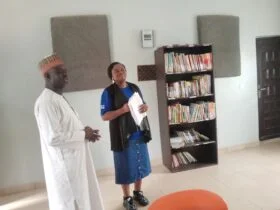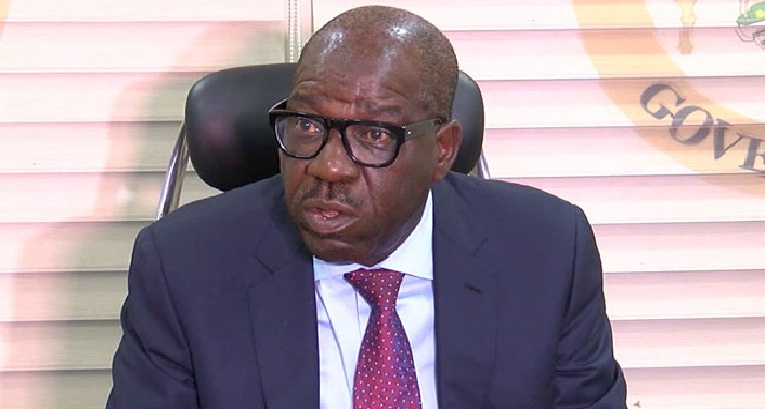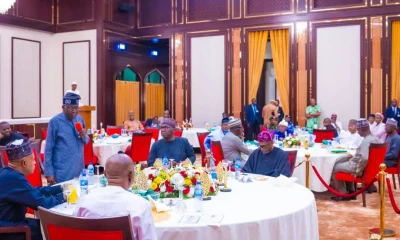view point
Kelvin Peter: Promoting Nigeria’s Commerce, Politics, Culture in the Prague
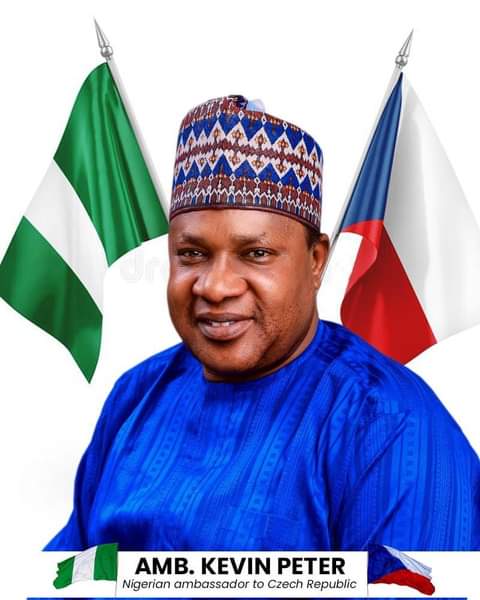
By Chris Alu
An Ambassador is someone who is nominated to build a friendly relationship with another country in the areas of commerce, politics, culture and education among other things between his country of origin and another country.
Both countries build their diplomatic ties in other to have mutual benefits with one another.
As well as strengthen their foreign policies and mission with a common goal of working together as one.
These and many more are what the Nigerian Ambassador to Czech Republic, His Excellency, Kelvin Peter is doing in the Prague, Czech Republic for his fatherland, Nigeria.
Apart from building stronger and diplomatic ties with Nigeria and Czech Republic, Kelvin Peter has performed excellently well to the admiration of all Nigerian living in the Prague and his home country Nigeria.
On his nomination by President Muhammadu Buhari and the Senate as Ambassador to Czech Republic, Kelvin Peter swung into action by presenting his letter of credence to the President of the Czech Republic Melos Zeman where he clearly stated President Buhari’s position on the need to build and promote strong bilateral relationship between the two countries and also promote peaceful coexistence as well as create economic, political, agricultural, commence and cultural ties between Czech Republic and Nigeria.
He also stressed the. Need of cordial relationship on mutual benefits in the areas of information technology development, foreign policies to both countries.
Ambassador who stated this in a grand ceremony organised in his honour also stressed the need for unity and peaceful coexistence between countries.
He urged the gathering to strengthen their diplomatic ties in order to assist one another in a good and workable relationship.
In the same vein, Ambassador Peter also admonished Nigerian living in the Prague to abide by the laws and regulations in the Czech Republic as well as being patriotic devoid of trouble in order to promote Nigeria as a country.
The Nigerian Ambassador to Czech further delves into meaningful and international discussions with stake holders on the need to strengthen diplomatic ties among European countries.
This was achieved by taken out time to meet with Nigerians in the Prague ,goverment officials on diplomatic mission and foreign diplomat including officials of the host countries , all of this was for him to create an enabling environment that will enhance a good and workable relationship of mutual benefits to both countries.
Ambassador Peter, also entered into a bilateral agreement on technological transfer to Nigerians.
He also foster and strengthen agricultural transfer hen he hosted Nigerian agricultural expert who weer on a three month course on modern mechanised system of farming in Czech Republic.
Kelvin Peter also hosted the honourable members House of Representatives committee on foreign affairs, who were on oversight function to foreign mission.
The committee was headed by its chairman Hon. Yusuf Buba.
Their mission was to review the activities of Nigerian missions abroad and their performances, where he gave them all the assistance they need all in a bid to make the mission work effective.
Ambassador Kelvin also promotes the talents of creative Nigerian in the Czech and have assisted Nigerian in the Czech in several ways including humanitarian assistance both home and abroad.
Ambassador Kelvin Peter is a role model who is described as a philantropist, a positive and creative man who is living a life humanitarian to the poor and the less privilege persons living with disability.
He is a man of innovative and entrepreneur who many are looking onto as a good leader, his footprints are already writing in gold for posterity sake.
A nationalist with strong patriotic antecedents, astute politician and experienced financial expert, Peter, a Fali by tribe, hails from Mubi North Local Government Area of Adamawa State.
His choice as an Ambassadorial Nominee from Adamawa State has been applauded by people across ethnic divides, religious lines and party affiliation.
Kevin Peter’s choice has been greeted with ovation across the state signaling that the Secretary to the federal Government, Barrister Boss Gida Mustapha and President Muhammadu Buhari has made a brilliant choice.
Hon. Peter is a man with a large heart, a detrabalised Nigerian who is practically putting into use what he has learnt in an area of his passion from several seminars both in Nigeria and outside the country, the Christian/Muslim relations.
Hon. Kevin Peter’s personality has endeared him to many People across the country, his simplicity has seen him relate with both the high and the lowly without discrimination. A trait that made him a people’s person, a political asset, a voice in his community and an enigma.
Hon. Kevin Peter holds a Masters Degree in Public Administration (MPA) after been certified as a Senior Financial Manager in 1995.
Peter was also conferred with an Honourary Doctorate Degree (PhD) Public Administration by All Saints University of America (ASUA) in 2010.
In his sojourn as a politician Hon. Kevin Peter was first elected as Chairman Mubi-North Local Government Area in 1999, re-elected Chairman Mubi-North Local Government in 2009. He is also the Adamawa North APC Zonal Chairman, a position he holds from 2018 till date.
He has served his state of Adamawa and the nation meritoriously in various capacities, including Chairman, screening committee, National Assembly Party Screening Committee for Ogun State in 2006; member, Adamawa State Presidential Initiative Distribution Committee in 2014; –Administrator, Mubi-North Development Area in 2007; Special Adviser on Border Integration, Adamawa State Government in 2012; Mubi-North Local Government Coordinator, for the federal Government program, SURE-P in 2013; Director General, Governorship Campaign, Adamawa State in 2014 and Special Adviser on Special Duties, Adamawa State Government in 2017.
view point
Tinubu’s Certificate and Atiku’s Wild Goose Chase

By Tunde Rahman
Former Vice President and roundly defeated presidential candidate, Alhaji Atiku Abubakar, was a pitiful sight to behold on Thursday at the Shehu Yar ‘Adua Centre, Abuja as he sat like a wreck after addressing what he called a world press conference. He had gone on a wild goose chase to the United States in search of President Bola Tinubu’s certificate.
The former vice president however returned empty-handed after spending a fortune.
Atiku himself admitted his exploratory journey was at a hefty cost.At the press conference, the Waziri Adamawa discovered no new thing; he found nothing incriminating or untoward against the President. He is only currently engaging in political sophistry.
Apparently deluding himself that he came back from the US with a smoking gun, at his press briefing, he sermonised on the important issue of leadership and responsibility. Alhaji Atiku assaulted the memory of the late irrepressible lawyer and human rights activist, Chief Gani Fawehinmi, SAN, claiming Fawehinmi inspired his shameful, worthless and self-seeking expedition.Commending David Hundeyin, the rabble rouser who styles himself as an independent journalist, whose work he also said inspired him, it became apparent that both Atiku and Hundeyin were actually working together to embarrass President Tinubu.
Overwhelmed by his inordinate ambition, the failed PDP presidential candidate also shamelessly called traditional, religious, community and political leaders in the country including Labour Party’s Peter Obi and NNPP’s Senator Rabiu Musa Kwakwanso to rally round him in his political vendetta against President Tinubu.“This quest is not for or about Atiku Abubakar. It is a quest for the enthronement of truth, morality and accountability in our public affairs,” he said. And you wonder, what morality Alhaji Atiku was preaching. This is the same man who was indicted in the 2009 conviction of his accomplice, former United States Congressman William Jefferson, over bribery charges. Same man whose principal, former President Obasanjo, wrote a damaging testimonial on and whose years in Customs were signposted by corruption allegations.
If you have not read it, this is what former President Obasanjo said about Wazirin Atiku in Volume 2 Pages 31-32 of his book “My Watch”: “What I did not know, which came out glaringly later, was his parental background which was somewhat shadowy, his propensity to corruption, his tendency to disloyalty, his inability to say and stick to the truth all the time,a propensity for poor judgment, his belief and reliance on marabouts , his lack of transparency, his trust in money to buy his way out on all issues and his readiness to sacrifice morality, integrity, propriety truth and national interest for self and selfish interest.”
It is pertinent at this juncture to clarify some of the issues that emerged from the deposition by President Tinubu’s former school, Chicago State University, in order to understand Atiku’s deliberate and malicious distortion.
Speaking on oath in the testimonies contained in a deposition made in the Office of Angela Liu, Atiku’s legal counsel, in Chicago, US, CSU Registrar, Caleb Westberg declared that President Bola Tinubu attended and graduated with honours from the institution in 1979. He in fact asserted that President Tinubu is the same person who attended the school from 1977 to 1979. “We believe Bola Tinubu who attended CSU is the same person who is the President of Nigeria today. Tinubu is an unusual name in the US. He matched the records in the file against the information provided by the student or on behalf of the student.”
On the insinuation by Atiku’s lawyers that the Bola Tinubu who attended the school was a female on account of a clerical error spotted against Tinubu’s name, Westberg disclosed that the admission letter issued to the Nigerian President evidently proved he was a male and attended the school between 1977 and 1979.
Probed further to confirm if the Tinubu that enrolled at the school was a male or female, the registrar insisted, “Tinubu applied to the university as a male and a letter of admission was issued to a male.
“There were materials in Mr. Tinubu’s records that show he was a male in the application to CSU. Mr. Tinubu identified himself as a male. His letter of admission identified him as a male. It says: ‘Dear Mr. Tinubu’”, he said.
It is relevant to point out that in the US, premium is not placed on certificates, otherwise called diplomas, as we do here. Certificates are merely ceremonial. The emphasis is on transcripts. Employers and schools offering admissions for higher education will only ask for previous transcripts.
In most cases, the certificates are also printed by third party vendors. Many certificates are left uncollected because what is important is the transcript. The CSU has diplomas that students didn’t pick up in its possession.
“I have the diploma that was made available to Mr. Enahoro-Ebah in our possession because Mr. Tinubu did not pick it up. I do not have the diploma that was submitted to INEC in our possession because he had picked it,” Westberg clarified while responding to another question.
Other matters also came up during the over five-hour interrogation session that I do not want to bore you with in this piece. However, it is surprising that Atiku and co would claim President Tinubu forged his certificate simply because the CSU Registrar said he could not authenticate the certificate presented to him by Atiku’s lawyer as the document Tinubu presented to INEC for the 2023 Presidential Election. He said he cannot confirm because only Tinubu has the certificate which he ordered and which had been picked up for him and that the school does not keep students’ certificates. Nowhere in the interrogation did Westberg use the word fake or forged as Atiku’s lawyer tried to make him say so. Fact is there is no scintilla of doubt that President Tinubu attended and graduated from CSU. As my colleague, Temitope Ajayi, pointed out in his widely-publicised tweet, “You can only forge a certificate you never earned.” President Tinubu honourably earned his degree and he had no reason to forge the certificate of a degree he had in his kitty. He graduated Summa Cum Laude, with distinction. He was on the Vice Chancellor’s Honour List for all his years in the school. Insinuation by anyone that he forged a certificate he worked for is sad and misleading.
Indeed, attempts by some to liken the situation with those of the disgraced former House of Representatives Speaker, Salisu Buhari and former Minister of Finance, Kemi Adeosun are disingenuous.
Former Speaker Buhari forged the certificate of Toronto University he never attended. He was removed from office for the forgery. Former President Obasanjo later pardoned him. As for former Minister Adeosun, those who brought her to limelight and sponsored her for the ministerial appointment arranged a fake NYSC exemption certificate for her to scale Senate screening. The same people did her in when disagreements broke out between them, giving her away as a certificate forger over which she eventually resigned. The cases are markedly different: President Tinubu earned his stripes.
In the final analysis, it is yet unclear how Atiku plans to benefit from whatever he claims to have brought back from the US. Certificate forgery was not pleaded in his election petition now at the Supreme Court. Without being a lawyer, this is a civil case and I understand you can’t make new pleas or present new evidence in a case that has passed the court of first instance and is at present on appeal at the Supreme Court.
What the Waziri Adamawa has demonstrated in all of his Shenanigans is that he is a sore loser. Will he gain what he failed to get at the ballot through his present indecent and unpatriotic overseas search and unfounded and hollow discovery, making a mountain where there is even no molehill, unnecessarily heating up the polity and denigrating the Justices of the Supreme Court? I don’t think so!Rahman, former Editor of Thisday on Sunday Newspaper, is a Presidential Aide.
view point
Echoes of New Beginning
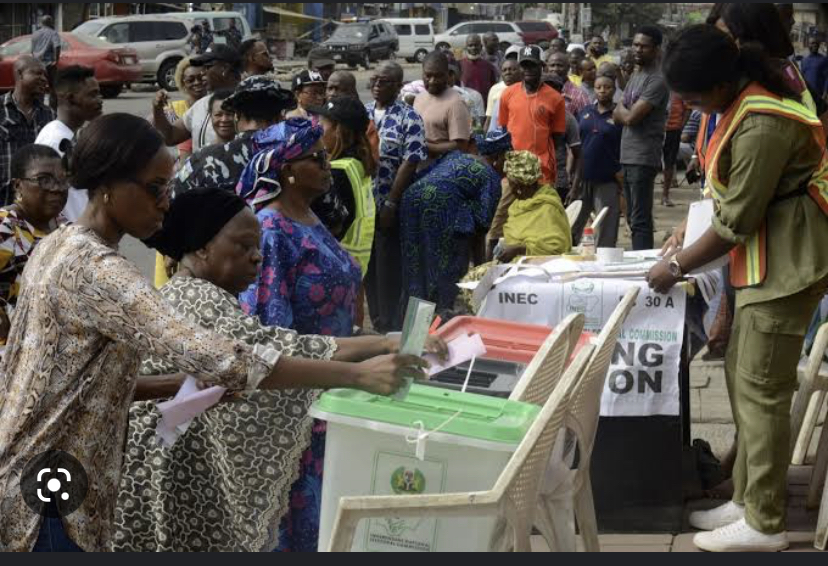
By Dakuku Peterside
Last Saturday’s presidential election marks a new beginning for Nigeria, if not literally, then clearly symbolically. Nigerian voters defied hunger, Naira crisis and appropriated that moment as a clear point of departure from the past. They embraced the election as if their lives depended on it.
The general high level of enthusiasm lifted voter turnout and reinforced confidence in democracy. Young people saw it as a chance to “get back their country”, plagued by bad leadership and underdevelopment. The fanfare and zest with which Nigerians trooped out in their numbers to perform a ritual that may not have rewarded them in the past but still managed to sustain their hope of a better future was electric. The presidential election revealed a divided, disillusioned, and disaffected Nigeria. Despite whatever will be the election’s outcome, most Nigerians believe the electoral process is a radical improvement on previous exercises, considering the size and complexity of the country. Previous polls have been anticlimactic both in process and outcome.Nigerians hope that this election will usher in a genuine democratic leader that represents the choice and voice of the people. The elections were generally peaceful and orderly, save for pockets of skirmishes in flashpoint states where thugs disrupted the polls, carted away ballot boxes, or tactically disenfranchised voters.
Regrettably, bad habits of thuggery and violent disruptions of the process resurfaced. Blatant violent hooliganism in states like Kogi, Lagos and Rivers overwhelmed security arrangements.
According to media reports and from the account of observers, youths turned out in their numbers to vote. Voters’ turnout from observation, in general, may be better than in the recent past, where voter apathy was prominent, and there was a continuous decline in the number of voters in each subsequent general election. Most persons who observed the polls I have spoken to are cautiously optimistic that it would be a relatively free and fair election, thanks to the recent amendment of electoral act which gave legal backing to Bimodal Voter Identification System ( BVAS) and other technological devices. From snippets of results, old political fiefdoms seem to be crumbling. Nigerians have rejected politics of hate, violence, and intolerance. If this is the case, it will mark a watershed in the political history of Nigeria.
Discerning persons must have observed four different echoes and reverberations with the elections. The first echo is that INEC prepared better this time around when compared with previous elections. The level of the organisation before and during the polls shows an improved INEC operation. INEC carried out voter sensitization, conducted mock exercises and reasonably assured the public of its best intentions . The use of technology was good, as voters can even find their polling units online. The identification method in polling units was remarkable, and we must commend INEC for even using the technology in remote parts of Nigeria. The BVAS technology generally worked, with failure in few places. Overall, the quality of the election conducted has improved. This evidences that Nigerian institutions can work if we are ready to do the work required to improve them.
However, there is also an elixir of mixed feelings about INEC’s preparation for this election. INEC allowed many familiar slip ups in logistics. Backup batteries for BVAS devices were not available in most places. INEC staff turned up late in a number of places. Voting started late or did not even take place in isolated instances. But given the tripartite problem of cash scarcity, fuel scarcity and infrastructural deficiency, one can only imagine the enormous challenge of organising this election in almost one hundred and seventy seven thousand polling units nationwide. Given the recurring logistics challenges in our elections, INEC must develop better ways of solving these problems to improve Nigerians’ voting experience. It is unfair that voters turned out to vote and either did not see INEC officials or the officials came late.
This lead to some voters being disenfranchised completely, or voting spills over to the following day. Besides, INEC officials could not upload the results from the polling units. This is a critical low point of the elections. Electoral fraudsters will probably “doctor” the results to their advantage — the same complaint all over the Federation.
The second echo is the high turnout of youth voters. Traditionally, Nigerian youths are dispassionate with politics and the electoral process. This was a shame, given that they comprise a more significant part of the population. In previous elections, voter apathy among youths was high, and most young people would rather be doing anything else than queue to vote in elections. Previous election post- mortem analyses often lambast youths’ lack of interest in the electoral process. The number of young people engaged in this election is remarkable and marks a departure from the old. The overwhelming youth turnout reinforced the future as the domain of youth.
This is significant in three ways: first, it may be a sign that the youths have suddenly realised that they have a part to play in selecting the country’s leaders. Youths’engagement in social media has made them adept at sharing their political views and championing political ideas. The second is that this large turnout signifies rebellion against orthodoxy. Young people are dissatisfied with the status quo and have decided to influence their future through political mobilisation and participation. Students of political sociology may need to chart the youth’s political consciousness through the various conflicts between the young people and the system (institutions, agencies, government), as seen in the ENDSARS revolt and other pro-youth agitations. These movements have crystallised in youth political advocacy. The third is that the large turnout of youths signifies their willingness to use their strength in number to take back political control from older leaders who have captured power in Nigeria for a generation. We hope that the extension of this considerable youth turnout in the next few years will signpost the young presenting themselves in more significant numbers to be voted for and metaphorically taking back their country.
The third echo is that many Nigerians have started demonstrating faith in the electoral process.
There was also a higher than usual awareness of democratic rights as voters strongly pressed their rights and opposed those out to violate those rights. The level of political awareness is encouraging and remarkable . The mantra in this election has been that “your vote counts”, and with the new voting technology, election rigging is brought to a minimum. This has inspired confidence in many people to vote. This will deepen our democracy and its corollary good governance in Nigeria. It is also significant to note that this is the first election since 1999 where none of the presidential aspirants came from the military. Nigerian democracy is gradually growing away from the control and influence of the former military generals who captured power and have defined our politics for over fifty years. Nigerians in this election have demonstrated their love for democracy and are willing to participate when they believe in the process. I hope that subsequent actions and inactions of the political gladiators and institutions post- election will be democratic. The calling of the election result, the declaration of victors, the litigations and appeal routines, the transition process and forming of the new government are all flashpoints that must be followed with caution and due democratic tenets to sustain the democratic bubble this election has created.
The fourth echo is that Nigerians want a new Nigeria and are full of new expectations from the incoming president. The new leadership faces high expectations from Nigerians who believe we are at the breaking point and things are no longer at ease. Nigerians expect the president-elect to chart a new course for the country towards economic, technological, social, and political regeneration that will improve the living standard of Nigerians. Nigerians are tired of suffering and living in the hope of a better Nigeria which honest leaders can build from our endowments. Whoever emerges as the president has his job cut out and must quickly act before Nigerians lose their patience. Whoever is declared victorious has no option but to embark on radical reforms on all fronts. He must initiate policies and programs that address youth concerns, particularly education, employment creation, insecurity, infrastructure, and good governance.
There is no doubt that Nigerians, both at home and abroad, are expecting a new and better Nigeria going forward. The election has sent echoes reverberating across time and space for a new beginning—a fresh start for more incredible things. Building the Nigeria of our dreams is a task for all and getting the leadership right is the first step towards achieving a greater Nigeria. We must continue with the passion and optimism of the election and put them to better use in productivity and innovation. I hope our youths are awake and in tune with the realities of our time. The future is for them, and they must work hard to build it. Economic and political participation is necessary for such growth. I implore all Nigerians to dare to dream of a better, greater, and prosperous Nigeria.
Dakuku Peterside is a policy and leadership expert.
view point
Ending Terrorism and Violent Extremism Through Community-based Reintegration
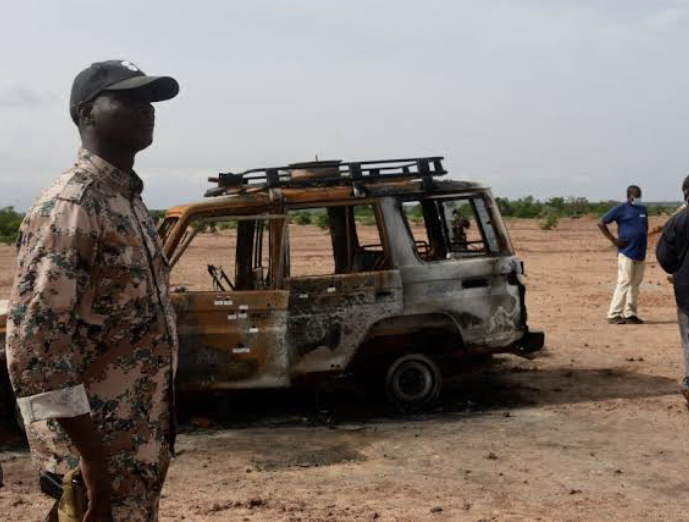
By Sumaila Ogbaje
The concept of Amnesty, Disarmament, Deradicalisation and Reintegration (DDR) are universal tools used in resolving conflicts and violence with remarkable results globally.
However, community-based reintegration is much more critical to sustainable peace in any country coming out of conflict.
Amnesty refers to a decision by government to allow political prisoners to go free. It has fixed period during which people are not punished for committing a particular crime and to hand in illegal weapons.
Disarmament on the other hand is taking away or giving up weapons while deradicalisation is the process of making someone become less extreme in their political, religious or ideological beliefs.
Reintegration on the other hand is an action or process of integrating someone back into society.
In Nigeria, there has been high emphasis on military response to the profound security and political challenges confronting the country.
In spite of that, issues of amnesty and negotiations are not new. Nigeria has at various times drawn on such lenient approaches to mitigate conflict when military actions failed.
The most prominent case was the amnesty programme for militants in Nigeria’s Niger Delta region in 2009.
In the North East’s violent and complex conflicts, some Boko Haram elements had transformed into international terror groups known as Islamic State of West Africa Province (ISWAP).
The complexity of the insurgency and the heterogeneous nature of non-state armed groups in the region demand that the state apply a mix of both military and civil approach to the crisis.
Thus, Operation Safe Corridor (OPSC), established in September 2015, was the first step towards amnesty and application of DDR solutions by Nigerian government towards ending insurgency and violent extremism in the North East.
According to the OPSC Coordinator, Maj.-Gen. Joseph Maina, the programme has successfully processed 1,573 clients, comprising 1,555 Nigerians and 18 foreign nationals from Cameroon, Chad and Niger Republics, since the OPSC commenced its DDR programme in 2016.
Maina also said 613 clients, including five foreigners from Chad and Niger, were transferred to the DRR camp on Sept. 8, 2022 to commence deradicalisation, rehabilitation and reintegration training.
The OPSC Coordinator, however, said 19 of the clients had to be transferred to the University of Maiduguri Teaching Hospital neurological centre for expert psychiatric management.
According to him, the 613 clients are low-risk repentant terrorists who will be rehabilitated and transferred to their various states in Nigeria for reintegration into the society.
This is where the concept of community-based reintegration becomes more imperative.
According to the National Centre for Counter Terrorism in the Office of the National Security Adviser (CTC-ONSA), transforming those who took up arms into normal civilians is crucial to ending violent extremism.
To drive this point, the centre recently held a 4-Day National Technical Workshop on Amnesty Management, Deradicalisation and Community-Based Reintegration in Abuja.
National Security Adviser (NSA), retired Maj.-Gen. Babagana Monguno, said the alarming scale at which youths are joining armed groups, demands greater focus on preventing radicalisation among young people and transforming those who took up arms into normal civilians.
Monguno said the DDR was fundamentally to re-establish state monopoly of violence and control, secure stability and initiate a process leading to sustainable development.
According to him, the concept and practice of amnesty is not new in Nigeria, as Federal Government and several states have repeatedly granted amnesties.
He however said that amnesty could be counter-productive to national security if there are no established policies and legislations, national ownership and coordination mechanism for the amnesty programme.
“Amnesty, Disarmament, Rehabilitation, Deradicalisation, Early Recovery and Reintegration fundamentally contribute to creating a stable and secure environment, so that overall development can begin and be consolidated.
“Significant success has been achieved with the security efforts in the North-East and North-West.
“However, the shifting strategy of violent groups and the inability of troops to hold and stabilise recovered territories create a key challenge.
“Thus, the cooperation of communities is unavoidable in the quest for Government to consolidate on the gains of ongoing Counter-Terrorism Operations while measures to win the hearts and minds of the population is critical, and gradual resettlement and reintegration of affected communities is crucial for success.
“This involves military, political, civil, social, economic and humanitarian interventions, implemented within a multi-stakeholder platform,” the NSA said.
According to Monguno, the scale of atrocities committed against communities have created conditions for hate and reprisals against real or perceived perpetrators, including the victims.
“Justice whether retributive, transitional or transformational are major precursors and should be prioritised by key stakeholders in the field.
“It is worthy of note that the DDR policy field is reconfiguring its tools, policies and practices to address the diversity of armed actors in contemporary conflicts,” he said.
The NSA said the Nigerian government has been complementing kinetic means with soft approaches, stabilisation and peace building measures to secure lasting peace in the country.
He explained that all peace-building processes related to armed conflicts require combatants to surrender their arms through voluntary or non-voluntary way, followed by demilitarisation and reintegration into civilian life.
The NSA said so far, the government, its partners and other stakeholders have been successfully implementing the DDR strategy, which was developed in collaboration with International Organisation for Migration to guide the OPSC programmes.
The Country Director, International Alert Nigeria, Mr Paul-Bemshima Nyulaku, however, said though deradicalisation was part of Operation Safe Corridor, the concept of community-based reintegration has not been too popular in Nigeria.
Nyulaku therefore said there was need to engage and sensitise communities to accept back repentant and deradicalised insurgents.
According to him, community-based reintegration is critical to sustainable peace in Nigeria.
He said as government continues to lead the DDR programme, it is important to properly engage communities to accept the programme.
The European Union (EU) Ambassador to Nigeria, Ms Samuela Isopi, during the ONSA workshop, expressed EU’s commitment to building on the works done to support reconciliation and integration in the North East.
She said the EU has been a long standing partner of Nigeria on both DDR and Preventing and Countering Violent Extremism, including amnesty, deradicalisation and community-based reintegration in the North East region.
According to her, the OPSC has so far been a model for other countries on what could be done to address violent extremism and reintegration of repentant extremists.
The envoy said the wave of mass exit of insurgents since 2021 in the North East was part of the success of the OPSC programme.
Similarly, the British High Commissioner to Nigeria, Catriona Laing, said considerable progress has been made by Nigerian Government and a number of states on non-kinetic approaches to resolving conflicts across the country.
Lang advised that while amnesty and voluntary DDR processes are essential components of successful conflict resolution, it should be done based on internationally acceptable laws.
She said that the processes should be complemented by robust, timely and fair criminal judicial procedures, especially for those who committed grave crimes.
“This is particularly important in the case of former associates of terrorist groups, as UN Security Council Resolution 1373 creates an obligation on all member states to bring terrorists to justice.
“In all cases, approaches must be compliant with international humanitarian and human rights laws.
“Even for those members of armed groups who will not undergo criminal prosecution, some form of justice may be necessary,” the envoy said.
Also, Nicolas Lang, the Swiss Ambassador to Nigeria, said the experiences in North East Nigeria showed that Demobilisation, Disarmament, Deradicalisation, Rehabilitation and Reintegration (DDDRR) were important alternatives to military combat in weakening insurgencies.
He said unlike before when conflicts involving non state armed groups like Boko Haram and ISWAP tend to portray that there could be no easy way out, the DDDRR has now triggered a sense that fighting does not have to be endless.
According to him, fewer armed conflicts around the world ended through military pressure and demobilisation strategies, as such the DDDRR is very significant to ending violent extremism and terrorism.
Lang said as frustrating as it may look, a lasting solution to the conflict in the North East will likely emerge through a political solution based on dialogue and talking, taking into account the different grievances of those affected by the conflict.
Sumaila Ogbaje is of the News Agency of Nigeria (NAN)

